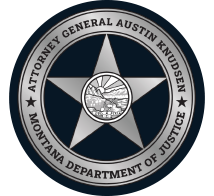HELENA – Attorney General Austin Knudsen announced today a human trafficking course developed by the Montana Department of Justice to raise awareness and educate Montana students about human trafficking and online exploitation.
The course, called “Enlightened,” was developed in coordination with anti-human trafficking organizations and features human trafficking survivors and Division of Criminal Investigation agents who are on the front lines combatting human trafficking. It includes a video and an in-class discussion sheet to help teachers and/or parents start the discussion and educate their students about human trafficking and internet crimes against children.
The Montana Department of Justice is working with the Office of Public Instruction to disseminate the curriculum to classrooms across the state.
“Young Montanans need to be aware of the problem and know the signs of human trafficking so they can recognize it and ask for help if they need it or knows someone who does. I’m thankful to the organizations, like Unchained, that helped us put this course together and joined us in the fight against human trafficking,” Attorney General Knudsen said. “I urge every parent, teacher, and school administrator to utilize this content. Together, we can keep children safe and stop human trafficking in Montana.”
“Our children are Montana’s most precious resources,” Superintendent Elsie Arntzen said. “This is a great opportunity for parents and teachers to promote safety and security through education. I am proud of the partnership between my office, the Department of Justice, and Unchained to protect all our Montana students.”
“Unchained is honored to partner with the Department of Justice and the Department of Education in our collective effort to protect the children of Montana from predators that seek to exploit and harm them through internet crimes and human trafficking,” Scott Roberts, CEO and founder of Unchained, said. “This threat is grave and growing. Through education, our families, schools and children will be much better prepared to recognize and avoid being victims of these horrible crimes.”
The curriculum is available on the DOJ’s website here: https://dojmt.gov/human-trafficking/.
Potential indicators of sex trafficking may include:
- Young person that is very hesitant to engage in conversation. Eyes are always downcast, avoiding eye contact, especially with men. Poor physical state…tired, malnourished, or shows signs of physical abuse or torture.
- Seems to have trouble responding to what their name is or what location (city or even state) they are in. (Victims’ names are often changed, as are their whereabouts. They typically do not stay in one location for long – at times for 24 hours or less).
- Wearing clothes that do not fit the climate or the situation such as short shorts or skirts, tank tops, and no jacket in the middle of winter.
- Lack of control over money, personal possessions like bags, ID’s, or documents. May also be carrying very few possessions in a plastic bag.
- May be accompanied by a dominating person, or someone they seem fearful of. That controlling person may also be someone who does not seem to “fit,” such as a much older individual, an individual of a different race, or with behavior seemingly inappropriate with the suspected victim.
- Young girl or boy hanging around outside a convenience store, truck stop, casino, or other location. May be approaching different vehicles or men they do not seem to know.
If you believe you witness human trafficking:
- If the situation is an emergency, call 911.
- Do not intervene if you see suspected trafficker(s). Remain at a safe distance or in your vehicle.
- In non-emergency situations, call or text 1-833-406-STOP (7867) OR reach and advocate via live chat at 406stop.com
- When possible, take images with your cellular device of the suspected trafficker(s), victim(s), and vehicle license plate(s).
Since Attorney General Knudsen began sounding the alarm in 2021, reported human trafficking cases have more than doubled. In 2023, Department of Justice agents tracked 147 human trafficking cases in Montana, an increase of 39 percent from 106 cases in 2022 and more than double the 68 cases in 2021. In 2015, there were just seven reported cases statewide.
During the 2023 legislative session, Attorney General Knudsen’s office helped write and pass House Bill 112, which was developed from discussions at previous symposiums. The new law increases the penalties for sex traffickers and patrons of sex trafficking. It also provides prosecutors with more tools to prosecute sex traffickers and expands the definition of human trafficking and has helped intensify the crackdown on the sexual abuse of children and all victims.
The legislation is already helping law enforcement crack down on sex trafficking. For example, last year, officials in Bozeman conducted a sting operation and arrested 18 individuals who were charged with 18 counts of patronizing a prostitute, five counts of criminal distribution of dangerous drugs, one count of resisting arrest, and one count of patronizing a victim of sex trafficking for a child victim.
Attorney General Knudsen also successfully advocated for two new human trafficking agents during the last legislative session, increasing the number agents to investigate human trafficking from two to four.
Attorney General Knudsen has also increased human trafficking training for county attorneys, Montana Highway Patrol Troopers, and law enforcement cadets at the Montana Law Enforcement Academy. He helped launch the Sentinel Project, a private-public partnership between the Montana Department of Justice and non-governmental organizations to increase human trafficking training and public education in the state.
